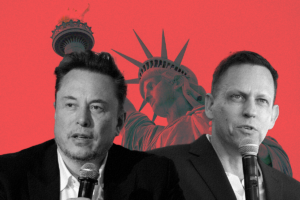Magical Thinking Is Stopping Us From Taking to the Streets
One reason people are quiescent in the face of racist, sexist, ecocidal outrage is their belief that Russiagate special prosecutor Robert Mueller will save them. A Donald Trump protester on Inauguration Day. (Fibonacci Blue / Wikimedia)
A Donald Trump protester on Inauguration Day. (Fibonacci Blue / Wikimedia)
The archplutocratic tax cut Washington politicians are working on this holiday season ought to be a call to arms for the United States’ populace. The nation’s economy is already so savagely unequal that the top 10th of its upper 1 percent owns as much wealth as its bottom 90 percent. Its corporations are raking in record profits. Half of its citizens have no savings. Half its population lives in or near poverty. Twenty-one percent of its children are growing up at less than the federal government’s notoriously inadequate poverty level, and 41 million Americans—12.3 percent of the population—are “food insecure.”
It is against the backdrop of this shocking disparity and related want that one should try to comprehend the regressive and malignant sociopathology of a Republican tax “reform” that:
● Drastically slashes the corporate tax rate without closing loopholes and deductions that allow the nation’s already cash-flush corporations to register their profits overseas.
● Does nothing to switch corporations’ focus from maximizing short-term returns to investing in the creation of more jobs and higher wages.
● Encourages corporations to invest in automation without offering any assistance to displaced workers.
● All but eliminates the estate tax for the nation’s richest families.
● Adds $1.5 trillion to the nation’s debt over the next decade, setting the stage for major slashes to the nation’s three biggest social insurance programs—Social Security, Medicaid and Medicare (they will be cut back in the name of “scaling back” so-called entitlement programs to “reduce the deficit”).
● Gives a major tax cut on profits multinational companies have stashed in offshore tax havens.
● Cuts taxes on “pass-through” businesses—a benefit that will be disproportionately enjoyed by the rich.
● Makes it easier for rich people to classify themselves as businesses to get a tax break.
● Increases the complexity of the tax code.
● Tightens deductions for lower- and middle-income wage-earners.
● Subsidizes private and religious schools, a boon to corporate school privatizers and the religious right.
● Repeals Obamacare’s individual mandate, which will leave millions without health insurance and raise the cost of health insurance.
The GOP tax “reform” rewards the already rich and punishes the poor at a time, The Atlantic notes, “when post-tax corporate profits have hovered at a record-level high for the last seven years, and the 1 percent’s share of total income is higher than at any time in the second half of the 20th century.” The just-passed Senate bill, likely to be “reconciled” with the right-wing House version and signed by Donald Trump before Christmas, grants what New York magazine calls “a huge windfall for the wealthiest Americans.” It is “certain to exacerbate income [and wealth] inequality at a time when the playing field is already heavily tilted towards the rich.” The New Gilded Age is slated to become yet more grotesquely unequal.
As some GOP congressmen have acknowledged, Republican legislators are acting at the command of their billionaire and millionaire “donor class.” “My donors are basically saying, ‘Get it done or don’t ever call me again,’ ” Rep. Chris Collins, R-N.Y., candidly told The Hill.
Adding authoritarian insult to plutocratic injury, the Senate tax bill was rammed through the upper chamber with brutal speed and barely a speck of public input. As John Cassidy notes in The New Yorker, “the process … [has] … been a travesty of the legislative process. … [T]here have been no public hearings, and the measure is being rushed through in a few weeks, with virtually no transparency.”
The speed-up and smash-through reflects Republicans’ awareness that a significant majority of the populace rejects the tax “reform” (it’s curious how commonly regressive measures are sold as “reforms”). A Nov. 15 Quinnipac poll found that just 25 percent of U.S. voters approve of the Republican tax plan. More than half (52 percent) disapprove. By a 59 to 33 percent margin, voters said that the plan “favors the rich at the expense of the middle class,” and 61 percent believe “the wealthy would mainly benefit.” Just 36 percent believe the plan will lead to an increase in jobs and economic growth.
This makes the Trump-GOP House and Senate tax bills “among the least popular pieces of major legislation in modern history, with the public rejecting it by a two-to-one margin,” Derek Thompson wrote.
So why don’t we see millions of Americans in the streets protesting the brazenly oligarchic tax heist being perpetrated in the name of “fairness,” “simplicity” and even “democracy”? I can’t answer that question in full here. The forces and factors that have turned tens of millions of Americans into an inert mass are numerous and complex. They deserve book-length treatment and have received it: See, for starters, Alex Carey’s “Taking the Risk Out of Democracy: Corporate Propaganda versus Freedom and Liberty”; Sheldon Wolin’s “Democracy Incorporated: Managed Democracy and the Specter of Inverted Totalitarianism”; Chris Hedges’ “Empire of Illusion: The End of Literacy and the Triumph of Spectacle”; Henry Giroux’s “Terror of Neoliberalism: Authoritarianism and the Eclipse of Democracy”; and my own “They Rule: The 1% v. Democracy.”
Part of the answer lies in the pervasively disseminated belief that we the people get meaningful say on the making of U.S. policy by participating in the “competitive” biennial major-party and candidate-centered elections that are sold to us as “politics”—the only politics that matter. Showing how and why that’s a false belief was the mission of my last Truthdig essay, titled “U.S. Elections: A Poor Substitute for Democracy.”
A second populace-demobilizing form of n thinking that is keeping people quiescent in the face of abject racist, sexist, ecocidal and classist-plutocratic outrage is the belief or dream that Russiagate special prosecutor Robert Mueller will save us and our supposed democracy by putting together a slam-dunk case for impeachment and removal on grounds of collusion with Russia and/or obstruction of justice.
A remarkable 47 percent of the electorate already supports impeachment less than a year into Trump’s first year. But so what? There is an outside chance that the malignant quasi-fascist tumor that is Donald Trump can be cut out this way. As liberal commentator Peter Beinart notes in The Atlantic, however, the odds of impeachment are poor. This is because “impeachment is less a legal process than a political one,” and the partisan alignment in Congress favors Trump in ways that appear unbreakable, given Republicans’ control of Congress and the dogged determination with which Trump’s white nationalist base is deplorably determined to stand by its man, no matter how low he sinks. As Beinart explains:
Passing articles of impeachment requires a majority of the House. Were such a vote held today—even if every Democrat voted yes—it would still require 22 Republicans. If Democrats take the House next fall, they could then pass articles of impeachment on their own. But ratifying those articles would require two-thirds of the Senate, which would probably require at least 15 Republican votes. …That kind of mass Republican defection has grown harder, not easier, to imagine. It’s grown harder because the last six months have demonstrated that GOP voters will stick with Trump despite his lunacy, and punish those Republican politicians who do not. … Among Republicans, Trump’s approval rating has held remarkably steady. Trump’s approval rating among Republicans has not dipped below 79 percent since he took office. None of the revelations from Mueller’s investigation—nor any of the other outrageous things Trump has done—has significantly undermined his support among the GOP rank and file.
Meanwhile, Arizona’s Jeff Flake and Tennessee’s Bob Corker, the two Republican senators who have had the decency to openly challenge Trump, have lost much of their support from GOP voters in their states.
Also rightly skeptical about prospects for Trumpeachment is Newsweek’s liberal political editor Dalia Lithwick. She finds it distinctly possible now that the purported “rule of law” has become “a relic” in “our ongoing nightmare of creeping authoritarianism.” She says we may have to shed the “magical thinking” that tells us that the U.S. “is a nation of laws, not men” as we behold “the shocking norm-and-truth defiance of the GOP tax bill, the refusal of the GOP leadership to criticize or even comprehend the enormous violence done by Trump’s anti-Muslim tweets, the president’s staggering support for the candidacy of Roy Moore, the silent Republican collusion to the seating of demonstrably unfit judges, and the virulence of the White House’s attacks on the press.” As one Trump outrage has piled up on top of another this year, Lithwick reflects, “it’s become clear that absolutely nothing will persuade Trump supporters and Republicans in Congress that it’s time to disavow the president. Given that reality, it often feels like it wouldn’t be enough for Mueller to hand us a smoking gun and an indictment. What if they threw a conviction and nobody came?”
The Mueller investigation, Lithwick writes, has helped “numb us, and leads to a declining sense of agency. … So long as Mueller is working, filing documents, and convening grand juries,” we are lulled into believing that “nobody has to take to the streets.”
The chances of Mueller or some journalists coming up with blockbuster revelations powerful enough to shake Trump’s hold on the GOP and his white-nationalist base are low. Most Alabama Republicans still back alleged child molester Roy Moore. The great majority of conservatives get their news from the pro-Trump, right-wing media ecosystem, led by Fox News, talk radio and Breitbart. As Beinart notes, that media can be counted on to “downplay or distort virtually anything Mueller or the mainstream press discovers” and to depict any push for Trump’s removal as a provocative “ ‘left-wing coup.’ ”
It seems more likely that Trump will be removed from the White House by his insane, cardiology-defying McDonald’s diet than through constitutional defenestration.
Forget for a moment the fact that establishment liberals like Beinart and Lithwick likely exaggerate the significance and degree of Russian intervention in the 2016 election (a drop in the bucket compared with the influence of U.S. corporate and financial money). Forget also that impeachment would place the right-wing Christian Mike Pence in the Oval Office; that the tax bill is slated for Trump’s signing long before he could be gotten rid of through impeachment or—another fantasy—ejection on the grounds of the 25th Amendment; and that U.S. plutocracy reigns with corporate Democrats in office, too (review the neoliberal records of the Bill Clinton and Barack Obama presidencies). Those key points aside, Beinart and Lithwick offer wise and informed counsel on how impeachment is a pipe dream that helps keep citizens passive and, as Lithwick notes, off “the streets.”
Here I might add that the nightly roster of talk-show hosts and comedians making endless fun of the ridiculous bad grandpa in the White House (Trump is a truly a gift that keeps on giving for late-night comedy) may help feed the fantasy that Trump is just a passing dream and not a clear and present danger to democracy and life on earth.
In an important commentary in The New York Review of Books in March, Russian dissident Masha Gessen tried to warn U.S. liberals and progressives against putting their anti-Trump eggs in the Russia basket. Gessen felt that the Russiagate gambit would flop, given a lack of smoking-gun evidence and sufficient public interest, particularly among Republicans. Gessen also worried that the Russia obsession was a deadly diversion from issues that ought to matter more to those claiming to oppose Trump in the name of democracy and the common good: racism, voter suppression (which may well have elected Trump, by the way), health care, plutocracy, police- and prison-state-ism, immigrant rights, economic exploitation and inequality, sexism and environmental ruination—you know, stuff like that.
Some of the politically engaged populace noticed the problem early on. According to the Washington political journal The Hill, last summer, “Frustrated Democrats hoping to elevate their election fortunes have a resounding message for party leaders: Stop talking so much about Russia. … Rank-and-file Democrats say the Russia-Trump narrative is simply a non-issue with district voters, who are much more worried about bread-and-butter economic concerns like jobs, wages and the cost of education and healthcare.”
Here we are now, half a year later, careening into a dystopian holiday season. With his epically low approval rating of 32 percent, the orange-tinted bad grandpa in the Oval Office is getting ready to sign a viciously regressive tax bill that is widely rejected by the populace. The bill will be sent to his desk by a Congress whose current approval rating stands at 13 percent. It will be a major legislative victory for Republicans, a party whose approval rating fell to an all-time low of 29 percent at the end of September—a party set to elect an alleged child molester to the Senate.
The dismal, dollar-drenched Democrats, the party of “inauthentic opposition,” are hardly more popular. Their approval mark was 37 percent in a recent CNN poll, their lowest level in 25 years. Pervasive scorn for the party is richly appropriate, given its role as “the graveyard of social movements” and its long history of serving the nation’s financial, corporate and imperial ruling class. As the venerable progressive hero Ralph Nader recently told The Intercept:
There are some people who think the Democratic Party can be reformed from within by changing the personnel. I say good luck to that. What’s happened in the last twenty years? They’ve gotten more entrenched. Get rid of Pelosi, you get Steny Hoyer. You get rid of Harry Reid, you get [Charles] Schumer. Good luck. … Unfortunately, to put it in one phrase, the Democrats are unable to defend the United States of America from the most vicious, ignorant, corporate-indentured, militaristic, anti-union, anti-consumer, anti-environment, anti-posterity [Republican Party] in history.
“Unable” or unwilling? As two sharp Canadian correspondents recently wrote me in response to Nader’s reflections:
“ ‘Unable?’ No. Unwilling? Absolutely. The Democrats are ‘history’s second-most enthusiastic capitalist party,’ in the words of Richard Nixon strategist Kevin Phillips. They are dive artists. This is what they do: provide the illusion of opposition. “They are unreformable. Workers need their own party” (Matt Gardner).
“It is worse than merely being unable to defend working people from the Republicans. The Democrats are serially complicit in these multi-level attacks and the wars launched on the outside world” (Gabriel Alan).
The plutocratic tax “reform” right now is a perfect example. The GOP is likely to pass this epic fiscal robbery in the next few weeks—Merry Christmas, 1 percent—and the inauthentic opposition party, which essentially elected Trump last year (see this remarkable new volume) are blathering on endlessly about Russiagate while pathetically bemoaning that Trump is not being more “bipartisan,” on the model of the malicious right-wing president Ronald Reagan’s 1986 tax bill. MSNBC’s rambling rock star Rachel Maddow is a ferocious lioness on Russiagate and a whiny kitten on the arch-corporatist, Putin-like tax bill.
It’s surreal. An explosion of sex scandals, the interminable Russia madness, a bizarre embassy move in Israel, an Alabama freak show, a prolonged game of bizarre verbal-thermonuclear chicken between the insane clown president in Washington and the dear leader in Pyongyang combine with the National Football League, Netflix, online shopping and porn, endemic video-gaming, epidemic mass shootings and the mindfulness and happiness industries to run diversionary interference for the evermore drastic and dangerous upward concentration of “homeland” wealth and power. Meanwhile, the death knells of the coming environmental catastrophe Trump is dedicated to accelerating—with unmentionably climate change-driven “wildfires speaking apocalyptic destruction” across Southern California this week—ring across the land and the world, barely breaking into the presidentially obsessed news cycle.
Welcome to the de facto banana republic that is, as Noam Chomsky said, America’s “really existing capitalist democracy—RECD, pronounced as ‘wrecked.’ ”
Revolution, anyone?
Your support is crucial…With an uncertain future and a new administration casting doubt on press freedoms, the danger is clear: The truth is at risk.
Now is the time to give. Your tax-deductible support allows us to dig deeper, delivering fearless investigative reporting and analysis that exposes what’s really happening — without compromise.
Stand with our courageous journalists. Donate today to protect a free press, uphold democracy and unearth untold stories.









You need to be a supporter to comment.
There are currently no responses to this article.
Be the first to respond.